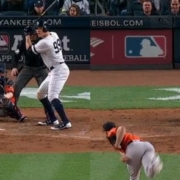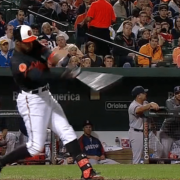Fix Swing Loop, Dropping Barrel, And Pulling Vs Hitting Opposite Field With Power For Baseball, Softball, & Slow Pitch | Do Stay Or Keep Hands Inside Cues Work? | Overload/Underload Bat Training Workout | Freddie Freeman & Ronald Acuna Jr. Analysis
Learn how to fix loop in swing, dropping barrel, and pulling vs hitting opposite field with power for baseball, softball, and slow pitch players. Do stay or keep the hands inside the ball cues still work? Discover the overload/underload bat training workout in this Freddie Freeman and Ronald Acuna Jr. swing analysis.
Freddie Freeman & Ronald Acuna Jr. Swing Analysis
Here’s a Freddie Freeman swing analysis compare and contrast video between him and Ronald Acuna Jr.:
- Freddie Freeman (6-foot, 5-inches, 220-pounds) & Ronald Acuna Jr. (6-foot, 180-pounds) offensive stats at BaseballReference.com,
- Discuss critical “line-to-line” principles Freddie Freeman talks about in Fox Sports South interview video below,
- Best time to use “hands inside ball” cues with youth hitters,
- Freddie Freeman using rounded back, showing numbers, staying sideways, and longer front arm shape,
- Explanation of a long swing (not in long lead arm), but having to do with hitting the “different catcher’s gloves”,
- Overload training to help young hitters to control their barrel, and
- Ronald Acuna Jr. not using rounded back (neutral), showing numbers a little, and longer front arm shape…
SCIENCE-BASED TRAINING:
Improve your hitting strategy dramatically by applying human movement principles.
Learn not only how and what to train but also the science behind the methods.
“Braves star Freddie Freeman gives in-depth tutorial on how to hit off a tee” Video
If you liked this Freddie Freeman swing analysis, then you may want to take a look at this…
- Fix Late Swings Fast: 2025 Pitch Recognition & See-Decide-Swing Training for Youth Baseball Power Hitters - October 6, 2025
- Safe Youth Weighted Bat Training: Proven Overload/Underload Drills to Increase Exit Velocity in Games Starting Tonight - September 29, 2025
- AI Coaching Course 2025: Youth Baseball & Softball Practice Plan + Off-Season & In-Season Workout Builder Fast - September 23, 2025













Joey,
I guess the debate will continue. In watching the NL playoffs, I couldn’t help but notice the swings of Freddie Freeman and Paul Goldschmidt, who both have the front arm action advocated in this article. I won’t focus on Freeman since he was battling an injury. But Goldschmidt was 1 for 16 in the NLCS with 9 strikeouts. He bars his front arm in the manner Perry Husband and you recommend in your articles on the subject. It doesn’t seem that his front arm action allows him to make the on-the-fly adjustments necessary, especially with all of the breaking pitches and changeups being thrown in the playoffs (I saw on the MLB Network that the percentages were up 10 – 15% from the regular season). Whereas, 36 year old Howie Kendrick, on his way to being named the NLCS MVP, seemed to adjust effectively with a bend in his front arm (He is not alone in his approach as Gleyber Torres, Aaron Judge, D. J. LeMahieu, Carlos Correa, Juan Soto, and Anthony Rendon all deploy a bent front arm as well).
Back to the adjustable swing vs arm bar debate, is the bent front arm more advantageous to a hitter, allowing him to make the necessary adjustments, than an arm bar approach? I tend to think so. Goldschmidt’s approach didn’t allow him to make the necessary adjustments.
Joe, you’ll find more “adjustable” swings because it’s the majority of what’s being taught swing-wise for the last 4 decades, and it’s fairly easy to teach. But it comes with consequences. You’re comparing two hitters – Goldschmidt and Kendrick – in a snapshot in time. Google these two on Baseball-Reference.com and you’ll see, the comparison in an average 162-game season isn’t even close. The debate may continue, but the evidence doesn’t lie. Any swing strategy comes with a consequence, and IMO, the longer front arm shape has more reward than risk.
Joey,
I am not disputing “the longer arm shape.” I agree that it straightens going into contact. It is the straightened front arm – like a pole – that I object to a la Paul Goldschmidt and Freddie Freeman. Your latest article on Mookie Betts and Trea Turner doesn’t show them using a straight front arm like Goldschmidt and Freeman. There is a bend in the front arms of Betts and Turner. Goldschmidt couldn’t adjust his swing in the NLCS. Maybe he is used to sitting on certain pitches but he got eaten up by the Nationals’ pitchers.
Joe, again, the adjustable front arm swing is what is mostly taught for the last 4-decades. It’s not what the greats did. And I know you know that.
Joey,
Did you catch Yuli Guriel’s HR in the first inning of Game 6 of the ALCS? He took a 96 mph inside high fastball from Chad Green into the seats. Granted he didn’t hit it 450 feet but he wouldn’t have hit that HR with a completely barred front arm.
I revisted your Shin Soo Choo article from a few years back. It is consistent with what you are saying. You denounced the early arm bar, which I am in agreement with. Yes, I realize what the greats did and do, just no early arm bar for me. I saw YouTube videos from Perry Husband in which he advocated the early arm bar, one with Jorge Posada and the other with two kids he was working with. The latter is no longer on YouTube. Just not a fan of the early arm bar. And a lot of greats have a sight bend in their front arm at contact.
I know you don’t like the early arm bar. I saw Yuli Gurriel’s homer with the chicken wing. You’re comparing apples to oranges here. Yuli Gurriel has a purely adjustable approach, his swing is reactive, not a proactive. The early arm bar strategy is terrible if you’re a reactive hitter. It won’t work. However, there’s more to early arm bar than that. To use it effectively, the hitter has to gather info on pitching patterns beforehand and tailor the barrel path approach to hunting in the zone. My top hitters in High School can hit a ball 2-3 balls up and inside with an early arm bar, and laser it. Not fair, but don’t throw it over the inner 1/3 because it’s going to be hit REAL hard. Slight bend to straight at impact is the goal with my hitters. The Shin Soo-Choo article is a bit outdated on what I teach now.
Joey,
Guriel’s swing looked awkward and he wouldn’t have it too far with that swing, but just enough. Yes, slight bend too straight. Choo article was not all that different from what you are saying now.